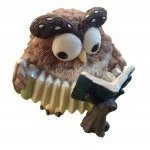-
Posts
1,629 -
Joined
-
Last visited
About Greg Jowaisas
- Birthday 03/03/1909
Contact Methods
-
Website URL
http://
-
ICQ
0
Profile Information
-
Gender
Male
-
Interests
Traditional and Old-Time American folk music. Irish Trad.<br />Banjo, Anglo and english concertina.<br />Repairing and rebuilding concertinas.<br />Making concertina cases.
-
Location
Kentucky, USA just south of Cincinnati and the Ohio River
Recent Profile Visitors
9,474 profile views
Greg Jowaisas's Achievements

Heavyweight Boxer (5/6)
-

Blurpy, raspy sounding low note.
Greg Jowaisas replied to 4to5to6's topic in Instrument Construction & Repair
Changing valves would be the place to start. Very important that your valves are centered over their slots. And while the chamber valve is off view the push reed from the chamber side just to make sure the push reed is centered while snug in its slot. Columbia leathers are the go to source in the U.S. There are other, less dependable, sources of hair sheep leather, so occasional searches and keeping your eyes open can pay off. -
Laurence Furr started following Greg Jowaisas
-

Original valves glued “in reverse”
Greg Jowaisas replied to rcr27's topic in Instrument Construction & Repair
This can be a way to deal with stubborn valve flutter. (I can't tell you why but sometimes it solves the problem!) Many of the Jones anglos I've refurbished used this treatment on a few of their valves. I suspect it could be to address valve flutter or deal with the sometimes "less than ideal" placement of the vents beneath the valves that were too close to the chamber walls. -

Greg Jowaisas email not working.
Greg Jowaisas replied to Notemaker's topic in Instrument Construction & Repair
Yes, the September 19th post has all the current contact info. Lost the 7062 land line and fioptics is the current email. -

Greg Jowaisas email not working.
Greg Jowaisas replied to Notemaker's topic in Instrument Construction & Repair
Still here. Cnet personal message will put you in touch. Email works for most people: gjowaisas (type the @ symbol) fioptics.com (I present it that way to fool the trolling "spiders" and keep the spam to a minimum.) You can also phone: (859) eight zero three 9472 and leave a message. Available repair time is limited and sometime in the future there will be shoulder surgery. But if possible I'm always willing to help. Greg -
Things I check with a sticky button: button/fret work bushing (I burnish with a tapered metal punch.) button arm bushing. The button must be able to move reasonably well on the arm as the angle changes up and down (burnish felt with an awl) Check arm alignment with guide pin hole. Arm must bisect hole when viewed from above. Less critical with a metal button but check guide pin for burrs or guide pin hole for irregularities On Lachenal hook and arms make sure the pivot plate is not excessively worn. (Especially when the arm has a bend or two to clear other buttons) Arm should not be twisted and primarily move up and down. Make sure pad is clearing the inner rim of action box After checking all the above, then, I'll adjust spring pressure if necessary.
-

Breathy Notes on 30 button Anglo
Greg Jowaisas replied to Cathasach's topic in Instrument Construction & Repair
"Nothing is wiggling or loose that I can tell. The reeds look correctly adjusted on their blocks. The pan looks firmly sealed all around." I had assumed (incorrectly) that you had a vintage instrument. Those with hybrid instruments and familiar with their construction may offer useful advice. -

Breathy Notes on 30 button Anglo
Greg Jowaisas replied to Cathasach's topic in Instrument Construction & Repair
The symptoms warrant a check of the reed pan support block that the reed pan rests upon. It is glued inside the bellows frame in that corner beneath the G/A and Bb/G# notes. Give it a good wiggle. Sometimes they look firmly attached but move once the concertina is put back together. -

67B Crabb Crane at Barleycorn.. Questions
Greg Jowaisas replied to seanc's topic in General Concertina Discussion
The ICA maintains the original Crane Driver site. You should find this link useful: https://crane.concertina.org/layouts.html -
In my experience dense felt starts out fine but can contribute to pad slap noise down the road. (How much glue used in their construction might be a contributing factor.) I can't tell you how many people have sent me instruments not all that old, suspecting action arm rivet noise, when the primary culprit turned out to be hard pads. (Thankfully much easier to replace pads than squeeze or replace rivets!) Greg
-
David Lay started following Greg Jowaisas
-
Still alive and well and repairing, refurbishing concertinas as time allows. You can message me thru concertina.net or call and leave a message: 859) 291-7062 9am to 7pm EST.
-
This piccolo Eb/Bb turned up in my neck of the woods. Wasn't sure what I was going to do with it but knew it was a quality instrument, fast as the devil and with a lovely, if high ringing sound. I tuned it and put it in good order and when Noel was in town for camp I showed it to him. He was impressed with the instrument and said it would be perfect to play with Frankie Gavin's 'F' flute. (D fingering for a C/G comes out as 'F' on an Eb/Bb concertina.) We made a deal and needless to say the concertina found a good home.
-
In the old wood hex cases there were generally three fabric covered wood blocks to support 50% of the six corners and keep the buttons from being depressed. Not much in the way of mitigating shock to the instrument if the case was dropped. There was also the ever present danger of bellows wear as the instrument was removed and reinserted in the traditional "end up" wooden case. There are horror stories of instruments being "trapped" in perhaps wooden cases that were not the original size as sold with the concertina. Some of the leather Jeffries hexagonal "jug" cases came with the same caveat. The concertina had one safe orientation into the case. if the end in was reversed or the hex orientation rotated a cherished instrument could be difficult to removed and possibly damaged. I will occasionally ship an instrument in a hex case to insure its safe passage but only with a strong suggestion the new owner find a proper case. The old wood hex cases and leather jug cases make excellent "stand alone" mantle displays. Greg
-
Capitanya started following Greg Jowaisas
-

Wheatstone Factory Photo
Greg Jowaisas replied to Chris Ghent's topic in Instrument Construction & Repair
I believe Bob Tedrow might defy that zero, Mike. https://www.yelp.com/biz_photos/homewood-musical-instrument-co-homewood -
I have a repair/refurbishment that could possibly use a replacement set of Whetstone Aeola reeds. I'm looking for steel tongues in brass shoes with the reeds in good shape, if possible from an instrument in the 1920s (serial # close to 30,000.) If you have a "rescue" Aeola languishing in the closet with reeds of of this description and you'd like to turn a project that you might not get to into cash, drop me a personal message or email. (leave out the exclamation points): !!gjowaisas@fioptics.com!! Best hopes for a happy and healthy New Year, Greg







